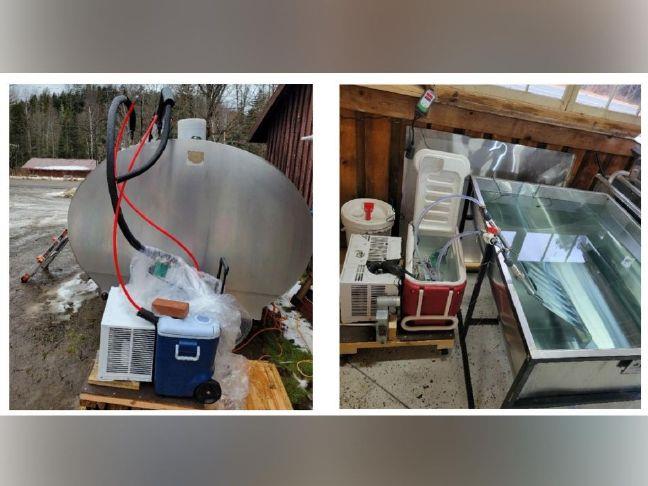Grants Available To Support Sustainable Agriculture Education And Practices – The Roundup Homepage

NCR-SARE Grant Opportunities Advance Sustainable Development Goals in Agriculture
Executive Summary
The North Central Region – Sustainable Agriculture Research and Education (NCR-SARE) program is offering four grant programs to promote research and education in sustainable agriculture. These opportunities are available to farmers, ranchers, educators, and researchers across 12 states, including North Dakota, South Dakota, and Minnesota. The grants are designed to foster innovation that directly contributes to several United Nations Sustainable Development Goals (SDGs), including Zero Hunger (SDG 2), Quality Education (SDG 4), and Responsible Consumption and Production (SDG 12).
Alignment with Sustainable Development Goals (SDGs)
Since 1988, NCR-SARE’s competitive grants have supported agricultural advancements that align with global sustainability targets. The program’s focus on economic viability, environmental stewardship, and quality of life for agricultural communities contributes to the following SDGs:
- SDG 2 (Zero Hunger): By funding projects that explore sustainable methods to improve agricultural productivity and solve on-farm challenges, the grants support the goal of ending hunger and promoting sustainable agriculture.
- SDG 4 (Quality Education): The Youth Educator Grant Program is specifically designed to provide young people with learning opportunities, fostering knowledge about sustainable practices from an early age.
- SDG 8 (Decent Work and Economic Growth): Grants empower farmers and ranchers to investigate innovative practices that can increase profitability and improve their quality of life, promoting sustainable economic growth within rural communities.
- SDG 12 (Responsible Consumption and Production): The core mission of the grants is to advance agricultural systems that ensure the responsible stewardship of land, air, and water resources.
- SDG 17 (Partnerships for the Goals): The Partnership Grant Program explicitly encourages collaboration between agricultural professionals and producers, strengthening the means of implementation for sustainable development.
Available Grant Programs
Four distinct grant programs are available to address different facets of sustainable agriculture:
- Farmer Rancher Grant Program: This competitive program provides agricultural producers with funding to research and implement innovative solutions to operational problems. It directly supports SDG 2 and SDG 8 by empowering producers to enhance their economic and environmental sustainability and share their findings with the community.
- Youth Educator Grant Program: This program aims to educate young people about sustainable agriculture. By investing in the next generation, it makes a direct contribution to SDG 4, ensuring inclusive and equitable quality education for all.
- Partnership Grant Program: This grant fosters cooperative projects between agriculture professionals and small groups of farmers and ranchers. It exemplifies SDG 17 by building effective partnerships to achieve shared sustainability objectives.
- Research and Education Grant Program: Intended for researchers and educators, this program funds projects that advance the body of knowledge in sustainable agriculture, contributing to the evidence base needed to achieve SDG 2 and SDG 12.
Application Deadlines and Procedures
Interested parties should note the following submission deadlines:
- Partnership Grant Program: Proposals must be received by November 20, 2025, at 4 p.m. CST.
- Farmer Rancher Grant Program: Proposals must be received by December 4, 2025, at 4 p.m. CST.
- Research and Education Grant Program: Preproposals must be received by December 4, 2025, at 4 p.m. CST.
- Youth Educator Grant Program: The call for proposals will open in mid-January 2026.
Complete details and application materials for all open grant programs can be found at the official NCR-SARE grants portal: https://northcentral.sare.org/grants/.
Contact Information
For additional information regarding the SARE program in North Dakota, please contact the NDSU Extension coordinators:
- Karl Hoppe: 701-652-2951
- Jeff Gale: 701-652-2581
SDGs Addressed in the Article
SDG 2: Zero Hunger
- The article focuses on grants from the Sustainable Agriculture Research and Education (SARE) program. The core mission is to “promote sustainable agriculture awareness and innovation,” which is central to ensuring long-term food security and ending hunger. The program aims to advance practices that ensure “stewardship of the land, air and water,” contributing to resilient and sustainable food production systems.
SDG 4: Quality Education
- The “Youth Educator Grant Program” is explicitly mentioned, with the aim to “provide young people with learning opportunities about sustainable agriculture.” This directly connects to providing quality education, specifically on topics related to sustainable development.
SDG 8: Decent Work and Economic Growth
- The grants are designed to improve the livelihoods of agricultural producers. The article states that the Farmer Rancher Grant Program helps producers explore “sustainable ways of increasing profits and improving quality of life,” which supports economic viability and growth within the agricultural sector.
SDG 9: Industry, Innovation, and Infrastructure
- The program’s grants are intended to “fund research and education projects that advance sustainable agricultural practices” and have advanced “agricultural innovation” since 1988. This focus on research and innovation within the agricultural industry aligns with SDG 9’s goal of fostering innovation and upgrading technological capabilities.
SDG 12: Responsible Consumption and Production
- The entire initiative is based on promoting “sustainable agriculture.” This concept is a cornerstone of sustainable production patterns, aiming for “stewardship of the land, air and water” to ensure resources are managed responsibly.
SDG 17: Partnerships for the Goals
- The “Partnership Grant Program” is specifically designed to fund “cooperative projects between agriculture professionals and small groups of farmers and ranchers.” This directly encourages and promotes partnerships among different stakeholders to achieve sustainable development goals.
Specific SDG Targets Identified
Target 2.3: Double the agricultural productivity and incomes of small-scale food producers
- The Farmer Rancher Grant Program provides producers with opportunities to “explore sustainable ways of increasing profits.” By funding projects that solve problems on their operations, the program directly supports the goal of improving the economic outcomes for farmers and ranchers.
Target 2.4: Ensure sustainable food production systems and implement resilient agricultural practices
- The central theme of the article is the promotion of “sustainable agricultural practices.” The grants fund projects that advance innovation in agriculture while promoting “stewardship of the land, air and water,” which is the definition of creating sustainable and resilient food systems.
Target 4.7: Ensure all learners acquire knowledge and skills needed to promote sustainable development
- The “Youth Educator Grant Program” is designed to “provide young people with learning opportunities about sustainable agriculture.” This directly contributes to educating the next generation on the principles and practices of sustainable development.
Target 9.5: Enhance scientific research, upgrade the technological capabilities…and encourage innovation
- The “Research and Education Grant Program” and the overall mission to fund “research and education projects” are aimed at advancing “agricultural innovation.” This directly supports the enhancement of scientific research within the agricultural sector.
Target 17.17: Encourage and promote effective public, public-private and civil society partnerships
- The article highlights the “Partnership Grant Program,” which is a competitive grant for “cooperative projects between agriculture professionals and small groups of farmers and ranchers.” This is a clear mechanism for building the multi-stakeholder partnerships that Target 17.17 aims to foster.
Indicators for Measuring Progress
Number of grants awarded to farmers and ranchers
- The article discusses multiple grant programs, including the “Farmer Rancher Grant Program.” The number of producers who receive these grants to “solve problems on their operations” can serve as an indicator of progress towards improving agricultural practices and incomes (Target 2.3).
Number of youth education projects funded
- The existence of the “Youth Educator Grant Program” implies that a key metric for success is the number of projects funded that provide “young people with learning opportunities about sustainable agriculture.” This would measure progress toward Target 4.7.
Number of research and partnership projects established
- The “Research and Education Grant Program” and the “Partnership Grant Program” are key components. The number of funded research projects and cooperative partnerships formed would be a direct indicator of progress in fostering innovation and collaboration (Targets 9.5 and 17.17).
Adoption of innovative sustainable practices
- The grants are intended to help producers “explore sustainable ways” and “share what they learn with others.” An implied indicator is the rate at which these innovative and sustainable practices, developed through grant-funded projects, are adopted by the wider farming and ranching community, measuring progress towards Target 2.4.
Summary Table: SDGs, Targets, and Indicators
| SDGs | Targets | Indicators |
|---|---|---|
| SDG 2: Zero Hunger | Target 2.3: Double the agricultural productivity and incomes of small-scale food producers. Target 2.4: Ensure sustainable food production systems and implement resilient agricultural practices. |
Number of grants awarded to farmers and ranchers to increase profits and solve operational problems. Rate of adoption of innovative sustainable practices developed through funded projects. |
| SDG 4: Quality Education | Target 4.7: Ensure all learners acquire knowledge and skills needed to promote sustainable development. | Number of youth education projects funded to provide learning opportunities in sustainable agriculture. |
| SDG 8: Decent Work and Economic Growth | (Implied) Support for economic viability and improved quality of life for agricultural producers. | Number of farmers/ranchers reporting increased profits and improved quality of life as a result of grant-funded projects. |
| SDG 9: Industry, Innovation, and Infrastructure | Target 9.5: Enhance scientific research…and encourage innovation. | Number of research and education projects funded to advance agricultural innovation. |
| SDG 12: Responsible Consumption and Production | (Implied) Promotion of sustainable production patterns through stewardship of land, air, and water. | Number of projects funded that focus on stewardship of natural resources. |
| SDG 17: Partnerships for the Goals | Target 17.17: Encourage and promote effective public, public-private and civil society partnerships. | Number of cooperative projects and partnerships formed between agricultural professionals and farmers/ranchers. |
Source: roundupweb.com
What is Your Reaction?
 Like
0
Like
0
 Dislike
0
Dislike
0
 Love
0
Love
0
 Funny
0
Funny
0
 Angry
0
Angry
0
 Sad
0
Sad
0
 Wow
0
Wow
0















































































